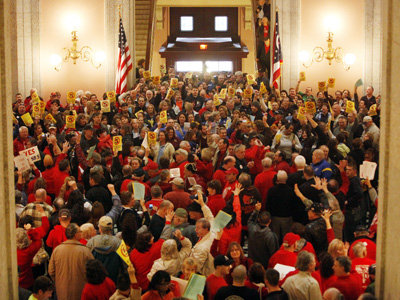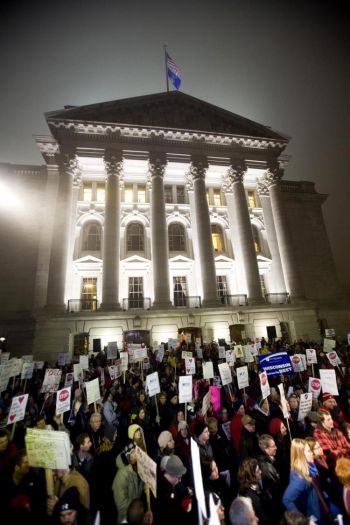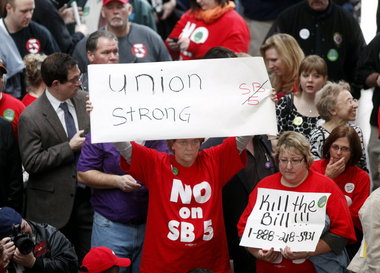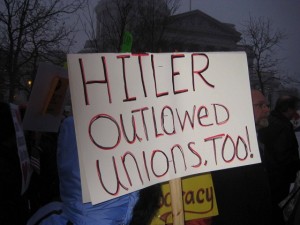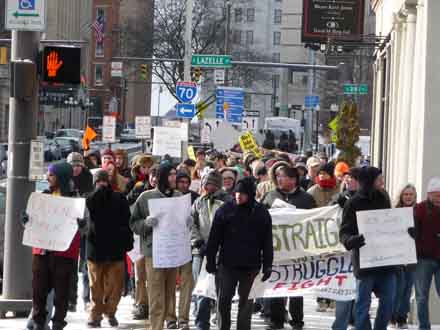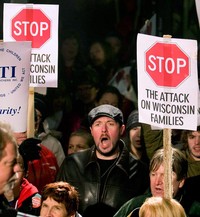PROTESTS SPREAD TO OHIO FROM WISCONSIN
By Mark Niquette – Feb 18, 2011
Bloomberg News, Feb. 18
(EDITOR: Go to VOD national page to read Stephanie Taylor’s column on the history of the use of military force against labor in the U.S. Governor Scott Walker in Wisconsin has threatened to call out the National Guard as crowds have now grown beyond 50,000 every day, and appear determined to remain.)
In what union leaders say is becoming a national fight, protests against legislation to restrict public employees’ collective-bargaining rights spread from Wisconsin to Ohio.
In Madison, Wisconsin, crowds that police estimated at 25,000 engulfed the Capitol and its lawns yesterday during a third-straight day of protests as Democratic senators fled the legislative session. In Columbus, Ohio, about 3,800 state workers, teachers and other public employees came to the statehouse for a committee hearing. President Barack Obama and House Speaker John Boehner, an Ohioan, argued over whether the bills are “an assault on unions.”
WATCH BLOOMBERG VIDEO AT —http://www.bloomberg.com/video/66862588/
Ohio firefighters Dave Hefflinger and Jerry Greer said they were. They stood near hundreds of workers elbow-to-elbow in the statehouse atrium and listened to a Senate hearing through speakers. Chants of “Kill the bill” echoed.
“We’re here to support our brothers and sisters,” Hefflinger, a 27-year veteran, said in an interview. “They’re trying to take away what we fought for all of these years.”
Hefflinger, 49, and Greer, 39, members of the department in Findlay, Ohio, drove two hours south to protest the bill. The measure would eliminate collective bargaining for state workers, prevent local-government employees from negotiating for health insurance and replace salary schedules with merit pay.
With states facing deficits that may reach a combined $125 billion next year, Republican governors including Wisconsin’s Scott Walker, Ohio’s John Kasich and New Jersey’s Chris Christie are targeting changes in rules for collective bargaining and worker contributions for health-care coverage and pensions.
Wisconsin Walkouts
In Wisconsin, Walker championed a bill that would make public workers bargain only for wages and require them to pay 5.8 percent of their pension costs; they pay nothing now. They would have to foot 12 percent of their health-care premiums, up from 6 percent. Police and firefighters wouldn’t be covered by the measure.
Fourteen Democratic senators disappeared from the Capitol yesterday, just as the Senate was about to begin debating, according to the Associated Press. Their flight brought the debate to a swift halt by denying the chamber a quorum, the news agency said.
‘Don’t Blink’
Yesterday, University of Wisconsin-Madison students walked out of classes at the urging of student government and campus newspapers and marched to the Capitol, about a mile away. There, they joined protesters who filled the rotunda to chant, bang drums and sing, and spilled outside.
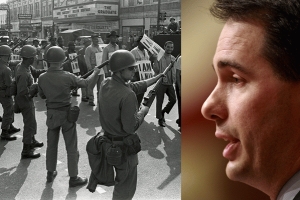
Wisconsin Gov. Scott Walker has threatened to call out National Guard; photo at left shows Guard threatening striking Memphis sanitation workers in 1968; Dr. Martin Luther King, Jr. marched with them and was assassinated shortly afterward
In a telephone interview Feb. 15, Walker said he spoke with Kasich about the demonstrations. When asked for advice, Walker said, “Don’t blink.”
The White House’s political operation, Organizing for America, helped to build crowds using social media, the Washington Post reported today, citing an unidentified Democratic Party official. Obama himself spoke to Milwaukee television station WTMJ.
“Some of what I’ve heard coming out of Wisconsin, where they’re just making it harder for public employees to collectively bargain generally, seems like more of an assault on unions,” the president said.
Boehner, a Republican from a Cincinnati suburb, responded with a statement saying he was “disappointed” that Obama criticized Walker.
Dire Challenges
“Republicans in Congress — and reform-minded GOP governors like Scott Walker, John Kasich and Chris Christie — are daring to speak the truth about the dire fiscal challenges Americans face at all levels of government, and daring to commit themselves to solutions that will liberate our economy and help put our citizens on a path to prosperity,” Boehner said.
The bills are state-level skirmishes in a national battle, and the purpose is to undermine labor unions and the Democrats they support, said John Russo, a professor and co-director of the Center for Working-Class Studies at Youngstown State University in Ohio.
“It’s really an ideological battle that’s being fought across the country right now,” Russo said yesterday in an interview while waiting to testify before the Ohio Senate Insurance, Commerce and Labor Committee. “This is a real teaching moment. Let’s have this debate about the role of the public sector.”
There were 50 witnesses scheduled, and Chairman Kevin Bacon said the committee would hear them without a break.
“This is a true test of democracy,” Bacon said.
Biggest Crowd
The statehouse spokesman, Gregg Dodd, estimated the crowd at about 3,800 and said it was the largest gathering inside the statehouse since it was renovated in 1996.
Mixing with protesters were members of Tea Party groups who staged their own rally in support of the legislation.
Mike Wilson, who founded the Cincinnati Tea Party, said the bill is an effort to restore balance between governments and their workers, who he said are overpaid.
“This bill is not on attack on public employees; it is not an attack on the middle class,” Wilson, 34, a technology consultant, said at the rally. “This bill is about math.”
Joe Rugola, the former president of the Ohio AFL-CIO who also is executive director of the Ohio Association of Public School Employees, said he represents bus drivers and janitors who earn about $24,000 a year.
“I’m still looking for this privileged class of workers,” Rugola said in an interview while waiting to testify. “This is just part of a national attack on working people.”
To contact the reporter on this story: Mark Niquette in Columbus, Ohio at mniquette@bloomberg.net
Public Worker Protests Spread To Ohio
Grace Wyler | Feb. 18, 2011
All eyes are on Wisconsin as a battle unfolds between public employee unions and Republican lawmakers looking to limit their collective bargaining rights. But as overburdened state governments look to close deficits and cut costs, other states are in the middle of the same debate.
In Ohio, a fight has been playing out more quietly over a bill that would end collective bargaining for all state workers and limit it for other public employees. The legislation would also eliminate salary schedules in favor of merit pay, a measure that has been heavily criticized by the state’s public safety workers’ unions. Unlike Wisconsin’s bill, the Ohio legislation includes firefighters and police officers unions.
About 3,800 firefighters, police officers, teachers and other public employees rallied outside the state Capitol during three days of state Senate hearings on the bill this week. Yesterday, about 200 Tea Party activists turned out to support of the legislation, the Columbus Dispatch reports.
Ohio legislators are expected to vote on the bill in the next few weeks.

